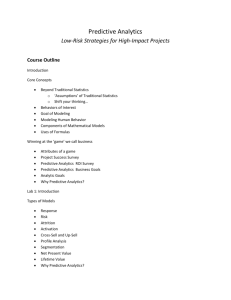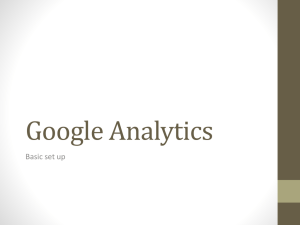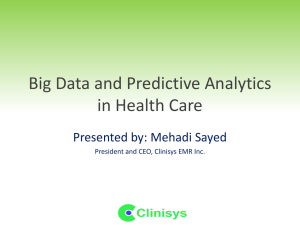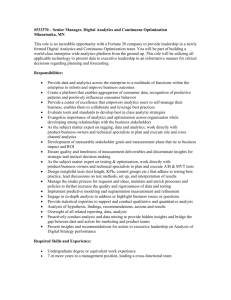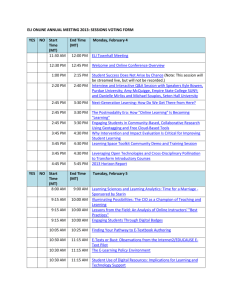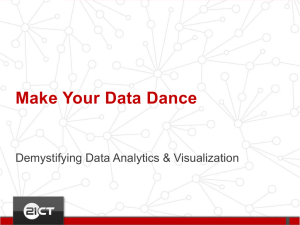attachment - Department of Finance, Insurance and Business Law
advertisement
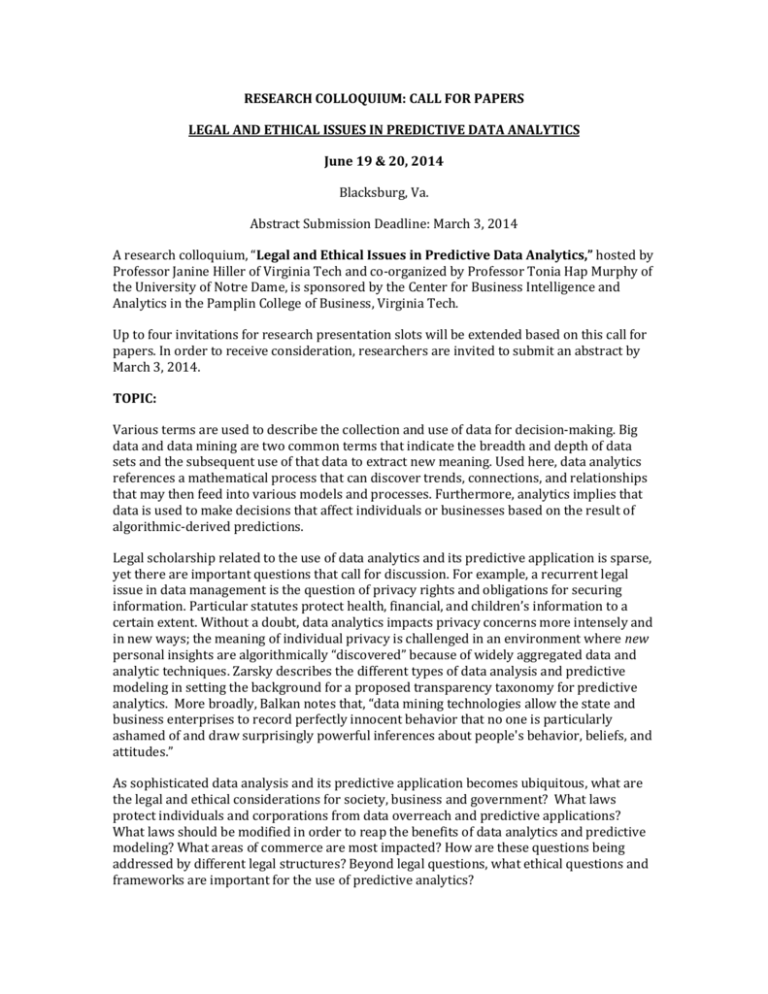
RESEARCH COLLOQUIUM: CALL FOR PAPERS LEGAL AND ETHICAL ISSUES IN PREDICTIVE DATA ANALYTICS June 19 & 20, 2014 Blacksburg, Va. Abstract Submission Deadline: March 3, 2014 A research colloquium, “Legal and Ethical Issues in Predictive Data Analytics,” hosted by Professor Janine Hiller of Virginia Tech and co-organized by Professor Tonia Hap Murphy of the University of Notre Dame, is sponsored by the Center for Business Intelligence and Analytics in the Pamplin College of Business, Virginia Tech. Up to four invitations for research presentation slots will be extended based on this call for papers. In order to receive consideration, researchers are invited to submit an abstract by March 3, 2014. TOPIC: Various terms are used to describe the collection and use of data for decision-making. Big data and data mining are two common terms that indicate the breadth and depth of data sets and the subsequent use of that data to extract new meaning. Used here, data analytics references a mathematical process that can discover trends, connections, and relationships that may then feed into various models and processes. Furthermore, analytics implies that data is used to make decisions that affect individuals or businesses based on the result of algorithmic-derived predictions. Legal scholarship related to the use of data analytics and its predictive application is sparse, yet there are important questions that call for discussion. For example, a recurrent legal issue in data management is the question of privacy rights and obligations for securing information. Particular statutes protect health, financial, and children’s information to a certain extent. Without a doubt, data analytics impacts privacy concerns more intensely and in new ways; the meaning of individual privacy is challenged in an environment where new personal insights are algorithmically “discovered” because of widely aggregated data and analytic techniques. Zarsky describes the different types of data analysis and predictive modeling in setting the background for a proposed transparency taxonomy for predictive analytics. More broadly, Balkan notes that, “data mining technologies allow the state and business enterprises to record perfectly innocent behavior that no one is particularly ashamed of and draw surprisingly powerful inferences about people's behavior, beliefs, and attitudes.” As sophisticated data analysis and its predictive application becomes ubiquitous, what are the legal and ethical considerations for society, business and government? What laws protect individuals and corporations from data overreach and predictive applications? What laws should be modified in order to reap the benefits of data analytics and predictive modeling? What areas of commerce are most impacted? How are these questions being addressed by different legal structures? Beyond legal questions, what ethical questions and frameworks are important for the use of predictive analytics? This colloquium seeks to promote research on the legal and ethical issues presented by the predictive use of analytics in society, emphasizing uses by business entities. Issues of interest include, but are not limited to, the following categories that are relevant to the discussion of data analysis, predictive modeling, and decision-making processes: Privacy and data security Consumer protection: price discrimination, targeting Employment decisions and analytics Corporate governance: decision-making, risk management, and oversight Health analytics and ethics Insurance: benefits, prices, structures Intellectual property: data and analytic ownership, trade secret protection Legal system: due process, e-discovery, evidentiary issues Antitrust: collusion and data International legal comparisons Ethical use of predictive data analytics in commerce National security: inferences, actions, and automation derived from data ********************* Submissions: To be considered, please submit an abstract of up to 750 words to Janine Hiller at jhiller@vt.edu, and copied to tmurphy1@nd.edu by March 3, 2014. Abstracts will be evaluated based upon the quality of the abstract and the topic’s fit with other presentations. Questions may be directed to Janine Hiller at jhiller@vt.edu or Tonia Hap Murphy at tmurphy1@nd.edu. Those submitting abstracts will be informed of the outcome by March 17, 2014. If accepted, the author agrees to submit a discussion paper of 7,500 to 10,000 words by June 2, 2014. Formatting will be either APA or Bluebook. The paper need not be in final form; however, it should be complete enough to benefit from and elicit discussion at the colloquium. In the case of papers with multiple authors, only one author may attend and present at the colloquium. The organizers are negotiating publication options for colloquium papers, with the goal of producing a scholarly book or special journal issue. While a final decision is pending, we are firmly optimistic about an ultimate publication. Authors agree to submit their final papers to be edited for inclusion in such a future publication. It is anticipated that final submissions and editing will occur in the fall of 2014. Colloquium Details: The colloquium will begin at noon on June 19th and conclude at the end of the day on June 20th 2014. Approximately 50 minutes is allotted for discussion of each paper. Presenters will submit discussion manuscripts by June 2, 2014. The manuscripts will be posted in a password protected members only forum online. Each participant agrees to read and be prepared to participate in discussions of papers. Participants may be asked to lead discussion of one other submitted paper. Participants will be provided with lodging and meals during the conference dates, but are responsible for transportation to Virginia Tech. SELECTED REFERENCES: Jack M. Balkin, The Constitution in the National Surveillance State, 93 Minn. L. Rev. 1, 2 (2008). Kenneth A. Bamberger, Technologies of Compliance: Risk and Regulation in a Digital Age, 88 Tex. L. Rev. 669 (2010). Big Data and Analytics: Seeking Foundations for Effective Privacy Guidance, http://www.hunton.com/files/Uploads/Documents/News_files/Big_Data_and_Analytics_Fe bruary_2013.pdf (for further information about the participants and project see http://www.informationpolicycentre.com/guidance_for_analytics/) Kate Crawford & Jason Schultz, Big Data and Due Process: Toward a Framework to Redress Predictive Privacy Harms, forthcoming in 55 B.C.L.Rev. – (2014). Multiple Authors, Privacy and Big Data: Making Ends Meet, Stanford Law Review Perspectives (see for discussion of multiple issues) http://www.stanfordlawreview.org/online/privacy-and-big-data Tonia Hap Murphy, Mandating Use of Predictive Coding in Electronic Discovery: An Ill-Advised Judicial Intrusion, 50 Am. Bus. L.J. 609 (2013). Charles Nyce, Predictive Analytics White Paper (AICPCU/IIA), available at http://www.theinstitutes.org/doc/predictivemodelingwhitepaper.pdf. Paul M. Schwartz, Data Protection Law and the Ethical Use of Analytics, available at http://www.informationpolicycentre.com/ethical_underpinnings_analytics/ SEC Announces Enforcement Initiatives to Combat Financial Reporting and Micro Fraud and Enhance Risk Analysis http://www.sec.gov/News/PressRelease/Detail/PressRelease/1365171624975#.UqiIUI0X h-M Eric Siegel, PREDICTIVE ANALYTICS: THE POWER TO PREDICT WHO WILL CLICK, BUY, LIE, OR DIE (2013). Omer Tene & Jules Polonetsky, Big Data for All: Privacy and User Control in the Age of Analytics, 11 Nw. J. Tech. & Intell. Prop. 239 (2013). Tal Z. Zarsky, Transparent Predictions, 2013 U. Ill. L. Rev. 1503 (2013).
